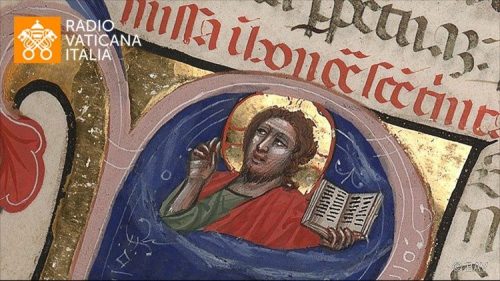READING OF THE DAY
Brothers and sisters:
Someone may say, “How are the dead raised?
With what kind of body will they come back?”You fool!
What you sow is not brought to life unless it dies.
And what you sow is not the body that is to be
but a bare kernel of wheat, perhaps, or of some other kind.So also is the resurrection of the dead.
It is sown corruptible; it is raised incorruptible.
It is sown dishonorable; it is raised glorious.
It is sown weak; it is raised powerful.
It is sown a natural body; it is raised a spiritual body.
If there is a natural body, there is also a spiritual one.So, too, it is written,
“The first man, Adam, became a living being,”
the last Adam a life-giving spirit.
But the spiritual was not first;
rather the natural and then the spiritual.
The first man was from the earth, earthly;
the second man, from heaven.
As was the earthly one, so also are the earthly,
and as is the heavenly one, so also are the heavenly.
Just as we have borne the image of the earthly one,
we shall also bear the image of the heavenly one.
GOSPEL OF THE DAY
LK 8:4-15
When a large crowd gathered, with people from one town after another
journeying to Jesus, he spoke in a parable.
“A sower went out to sow his seed.
And as he sowed, some seed fell on the path and was trampled,
and the birds of the sky ate it up.
Some seed fell on rocky ground, and when it grew,
it withered for lack of moisture.
Some seed fell among thorns,
and the thorns grew with it and choked it.
And some seed fell on good soil, and when it grew,
it produced fruit a hundredfold.”
After saying this, he called out,
“Whoever has ears to hear ought to hear.”Then his disciples asked him
what the meaning of this parable might be.
He answered,
“Knowledge of the mysteries of the Kingdom of God
has been granted to you;
but to the rest, they are made known through parables
so that they may look but not see, and hear but not understand.“This is the meaning of the parable.
The seed is the word of God.
Those on the path are the ones who have heard,
but the Devil comes and takes away the word from their hearts
that they may not believe and be saved.
Those on rocky ground are the ones who, when they hear,
receive the word with joy, but they have no root;
they believe only for a time and fall away in time of temptation.
As for the seed that fell among thorns,
they are the ones who have heard, but as they go along,
they are choked by the anxieties and riches and pleasures of life,
and they fail to produce mature fruit.
But as for the seed that fell on rich soil,
they are the ones who, when they have heard the word,
embrace it with a generous and good heart,
and bear fruit through perseverance.”
WORDS OF THE HOLY FATHER
Brothers and Sisters, Good morning!
The Gospel shows us Jesus preaching on the shore of the Lake of Galilee, and because a large crowd surrounds him, He climbs into a boat, goes a little away from the shore and preaches from there. When he speaks to the people, Jesus uses many parables: in language understandable to everyone, with images from nature and from everyday situations.
The first story he tells is an introduction to all the parables: that of the sower, who sows his seed unsparingly on every type of soil. And the real protagonist of this parable is actually the seed, which produces more or less according to the type of soil upon which it falls. The first three areas are unproductive: along the path the seed is eaten by birds; on rocky ground the sprouts are scorched and wither away because they have no roots; among the briars the seed is choked by thorns. The fourth piece of ground is good soil, and only there does the seed take root and bear fruit.
In this case, Jesus does not limit himself to presenting this parable, he also explains it to his disciples. The seed fallen on the path stands for those who hear the message of the Kingdom of God but do not understand it; thus the evil one comes and snatches it away. Indeed, the evil one does not want the seed of the Gospel to sprout in the heart of man. This is the first analogy. The second is that of the seed fallen among the stones: this represents the people who hear the word of God and understand it immediately, but superficially, because they have no roots and they are unsettled; and when trials and tribulations arise, these people give up immediately. The third case is that of the seed fallen among the briars: Jesus explains that this refers to the people who hear the word but they, because of the cares of the world and the seduction of riches, are choked. Finally, the seed fallen on fertile soil represents those who hear the word, accept it, cherish it and understand it, and they bear fruit. The perfect model of this good soil is the Virgin Mary.
This parable speaks to each of us today, as it spoke to those who listened to Jesus 2,000 years ago. It reminds us that we are the soil where the Lord tirelessly sows the seed of his Word and of his love. How do we receive it? And we can ask ourselves: how is our heart? Which soil does it resemble: that of the path, the rocks, the thorns? It’s up to us to become good soil with neither thorns nor stones, but tilled and cultivated with care, so it may bear good fruit for us and for our brothers and sisters.
And it will do us good not to forget that we too are sowers. God sows good seed, and here too we can also ask ourselves: which type of seed comes out of our heart and our mouth? Our words can do much good and also much harm; they can heal and they can wound; they can encourage and they can dishearten. Remember: what counts is not what goes in but what comes out of the mouth and of the heart.
Our Lady teaches us, by her example, to understand the Word, cherish it and make it bear fruit in us and in others.
(Angelus, 13 July 2014)

